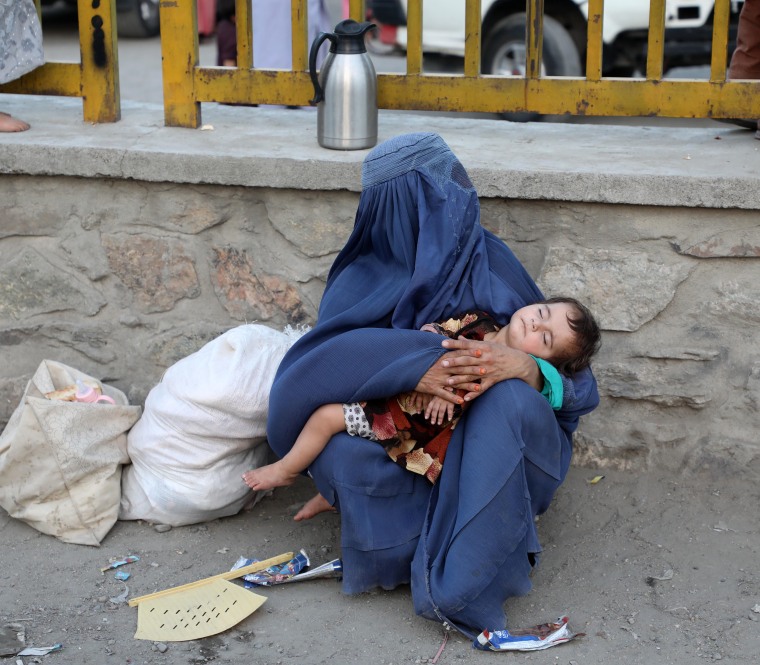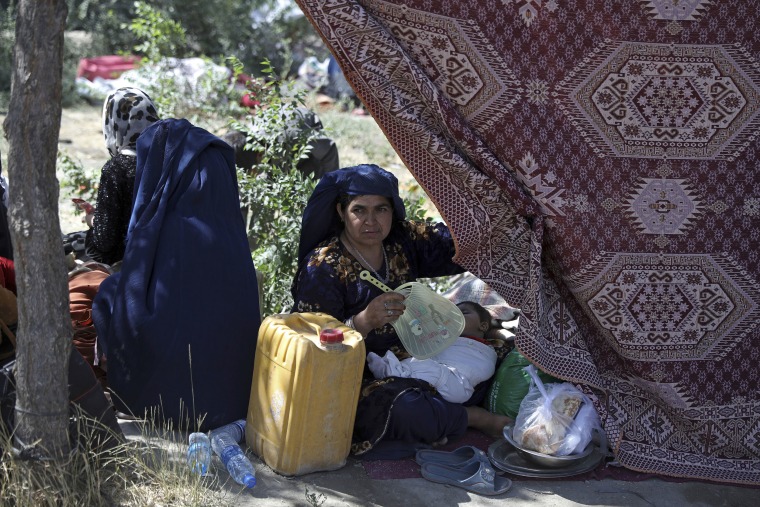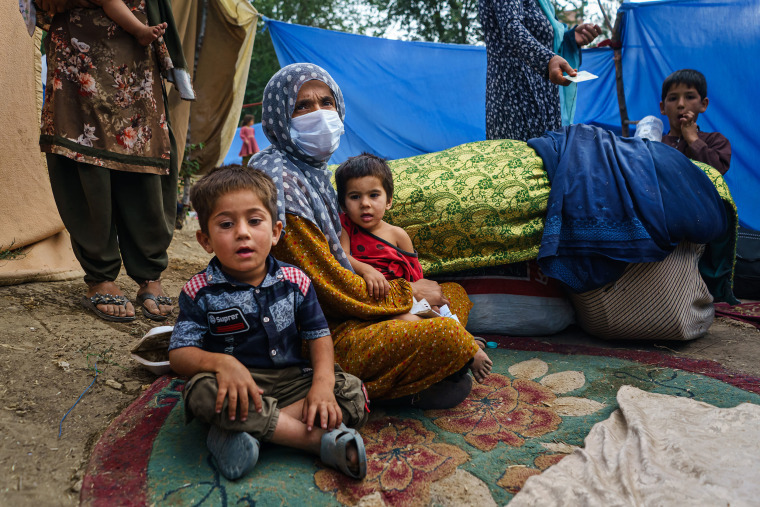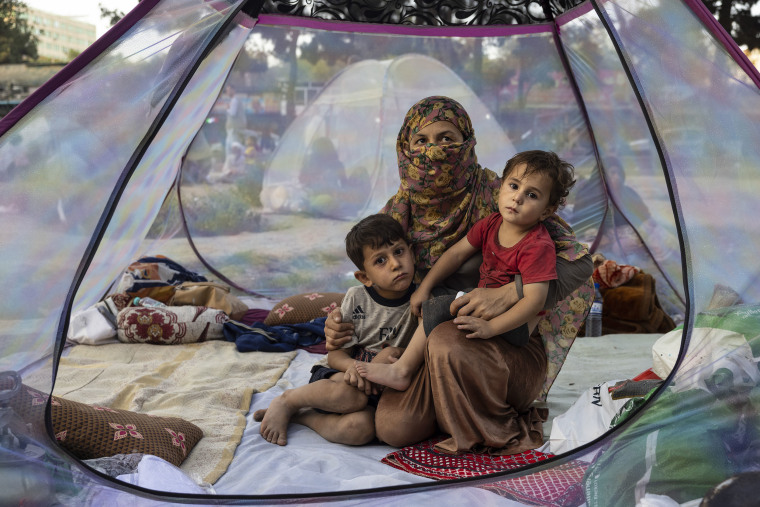Since the Taliban has seized control of Afghanistan, many women fear their lives will dramatically change. The militant group has long interpreted Islam in a way that harshly restricts women's rights.
For example, before the 2001 U.S.-led toppling of the regime that started in the mid-'90s, women were barred from leaving the house without a close male family member, M. Nazif Shahrani, a professor at Indiana University Bloomington who specializes in Islamic movements and Muslim family and gender dynamics, told TODAY. This meant that single moms without family support were in an especially difficult situation, as they couldn't even leave the house to beg. The Taliban did not permit women to work outside the home.
What comes next for women and single moms in Afghanistan will be determined by whether the Taliban returns to the "dark practices they used to do when they were in power for the first time," said Sher Jan Ahmadzai, director of University of Nebraska Omaha's Center for Afghanistan Studies. He added that the economic state of the country, currently dire, will also dictate opportunities for women, especially single women. Much of the international financial assistance of previous years was directed at women, but "unfortunately, it is yet to be seen whether those opportunities would remain," he said.
A brief history of single moms in Afghanistan
Single moms in Afghanistan exist largely for one of three reasons, Heather Barr, co-director of Human Rights Watch's women's rights division, told TODAY. The most common is that their husbands died — possibly from war, crime, lack of access to medical care or execution. Other possibilities are women who left their husbands (much more feasible during the past 20 years, when shelters for women started to pop up), or they had a child out of wedlock, the least common. Sex outside marriage was punishable with five to 15 years in prison under the previous government.
Shahrani explained that before the onset of wars in the country 43 years ago, the concept of a single mother was "alien." One reason is that among the Pashtuns, the country's largest ethnic group, a widow would often remarry one of her husband's close relatives, such as a brother or uncle.
"The family of the deceased husband would look after the woman and would take care of them. In other words, they would not be left out on the street," he said.

But with the communist coup in 1978 that kicked off decades of violence in the country, families were displaced, sometimes resettling in cities where they lived near strangers and didn't have the same community support. Meanwhile, large numbers of young men were dying in the conflict. Around this time, about 5 million people relocated to nearby Pakistan and Iran, while 2 million people were displaced inside the country, Shahrani said.
"Single mothers left basically on their own without protection is really a byproduct of the 40-something years of war in Afghanistan," Shahrani stressed. Barr added that many single women have struggled to keep their homes or rent one without a husband.
As Ahmadzai put it, single moms without male family to lean on, especially before the 2000s, were in "the worst economic situation. ... Single moms had the worst life."
Life for single moms under the previous Taliban regime
Before the Taliban took power in the '90s, a primary way for single moms to survive was through begging, performing menial tasks for money or having their children do the same, if they were capable, Shahrani explained.
But with the Taliban's restrictive rules on women leaving the house and working, "the means of their livelihood ... was taken away from them," he said. "We don't have statistics available as to what exactly happened during the Taliban reign to women who were denied the possibility of being outside in the streets. So many of them suffered in ways we don't know."

He said some single moms may have turned to prostitution to make a living, as it could be done in hiding.
If the Taliban discovered women going out alone, they would beat them, Ahmadzai said. He recalled once visiting Kabul when it was controlled by the Taliban: "If you wanted to help one person (on the street), you'd be mobbed. ... There was too much poverty, too many people who need help, and most of them were women."
As a man, Ahmadzai did not want to speak on behalf of single Afghan women during the Taliban rule, but he said, "I have seen them suffer from it tremendously."
The past 20 years and now
During the past 20 years, likely for the first time in Afghanistan's history, social services became available to single moms through international agencies, Shahrani said. Barr, who lived in Afghanistan from 2007 to 2013, pointed to the creation of a system of shelters for women who were the victims of violence.
"Something that I found really exciting in recent years is ... seeing that there was more space for women to live independent lives," she said.
Still, during the past 20 years, "abusive practices" toward woman and girls, such as forced marriage, child marriage and giving away girls to resolve family conflicts, continued, Barr said.

"Under the Afghan government that was in place from 2001 until 2020, there was progress. It was too slow and halting, but there was steady progress toward ending some of these abuses," she added.
Amid the current Taliban takeover, Barr explained those who had children out of wedlock are "at serious risk" because the previous government's prison sentence "may pale in comparison to the punishment by the Taliban, because the Taliban has continued to engage in lashings and stonings."
"The group of women who've left their husbands or divorced, they are also in serious trouble because the Taliban would not find it acceptable for women to have left their husband," she said. "If the husband abandoned them, then maybe they're off the hook, but ... there's a real risk that (women who left their husbands) would be seen by the Taliban as having behaved in an immoral way and be vulnerable to some kind of abuse because of that."
And widows may be at increased risk depending on who their husbands were, she explained. Widows of Taliban fighters "may be treated with love and generosity and respect," but she's more concerned for those whose husbands were in the country's national army or police.

Since its most recent takeover, the Taliban has pledged to respect the rights of women within the framework of Shariah law and would allow them to work and study. But Shahrani, Barr and Ahmadzai are all unsure if this will hold true.
"If the Taliban's practices are similar at all to what they were pre-2001, we're likely to go back to a society where women are really seen as the property of the men in their families and the men can do what they like with them," Barr said.
How to help single moms in Afghanistan
For people eager to donate to women's shelters in Afghanistan, Barr said to wait to see if these shelters will still exist. In the short term, she suggested donating to any organizations in your community that help resettle refugees families because they may be helping Afghan women.
You can also volunteer for such organizations, said Vrinda Narain, a professor at McGill University in Montreal who specializes in Muslim women and law. She says people can also help by pressuring political representatives to make sure that humanitarian aid to Afghanistan continues for as long as necessary and elevating the voices of Afghan women, whether on social media or elsewhere.
Ahmadzai added that there are ways for individuals to sponsor a woman or family, and that assisting nonprofits that teach single Afghan women skills can go a longer way than organizations that provide money.
Last, Shahrani emphasized the importance of educating yourself about the history of U.S. involvement in Afghanistan and the violence that's plagued the country to better understand why its single moms have suffered so much in the first place.
Related video:


